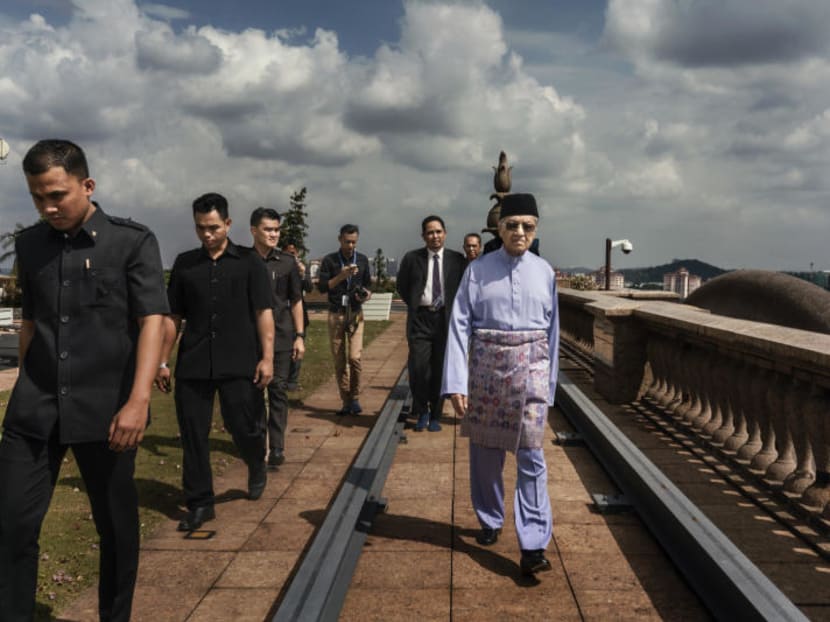Mahathir’s ‘reinvented’ populism has weakened ideological barriers, but what next?
There are sceptics who question Dr Mahathir Mohamad’s sincerity to bring about reforms, especially with the ease he was able to forge alliances with his former enemies. The Pakatan Harapan coalition must not be overly reliant on Dr Mahathir’s popularity, because the Barisan Nasional opposition can match its populist politics.

The image of Dr Mahathir Mohamad wanting to save the nation and make Malaysia respectable once again resonates with the masses, especially youths who are not familiar with events during his first term as prime minister.
In the past, Malaysia's Prime Minister Dr Mahathir Mohamad has been depicted as a soft authoritarian.
His political opponents went even further by calling him a dictator. Dr Mahathir often jokes that he is probably the only dictator in the world who resigned.
In 2003, he retired as prime minister, after 22 years in-charge, only to be re-elected prime minister again this year.
This time, the media and observers hailed him a saviour, reformer, and the man who engineered a new dawn for Malaysia. Even his one-time enemy, Anwar Ibrahim, is convinced that Dr Mahathir will bring about change in Malaysia.
There are of course sceptics who question Dr Mahathir's sincerity to bring about reforms, especially with the ease he was able to forge alliances with his former enemies.
However, the Pakatan Harapan (PH) coalition must not be overly reliant on Dr Mahathir's popularity, because the Barisan Nasional (BN) opposition can match its populist politics.
Both must invest more on uniting different voices in their respective coalitions, build on technical capacities, and prevent personality cults.
THE SUCCESS OF MAHATHIR'S POPULISM
Credit must be given to Dr Mahathir for his ability to reinvent his image from an "authoritarian" to a people's champion.
Netizens went wild with his recent expression of humility: walking the bazaars and night markets together with ordinary people; sitting on the same row with other congregants during Friday prayers, rather than the first one reserved for VIPs; and wearing a pair of "S$4" Bata sandals.
This contrasts with the perceived lavish lifestyle of his political opponents. Moreover, the fact that Dr Mahathir's wife Siti Hasmah Mohammad Ali is always seen alongside him also sits well with the masses, with the couple becoming a symbol of good family values.
The image of Dr Mahathir wanting to save the nation and make Malaysia respectable once again resonates with the masses, especially youths who are not familiar with events during his first term as prime minister.
Not many have paid attention to the remarks made by Dr Mahathir's opponents who highlighted his passion for riding horses, a considerably elitist lifestyle. Images of Dr Mahathir riding horses are documented in his memoirs A Doctor In The House.
To be sure, Dr Mahathir has successfully reinvented his image to one that identifies with the common man.
One is reminded of Indonesian president, Joko Widodo, who is known for his blusukan, or surprise visits to meet ordinary people to understand the root of problems.
For now, the government is banking on Dr Mahathir's popularity and there is no one else in PH who can match his charisma, with Anwar Ibrahim coming close.
But BN's fate may change soon, if its lynchpin party the United Malays National Organisation plays its cards well by electing the right person for president in the upcoming party elections.
The frontrunners now are former deputy prime minister, Ahmad Zahid Hamidi, veteran politician Tengku Razaleigh Hamzah and former youth and sports minister Khairy Jamaluddin.
The election of Mr Tengku Razaleigh will see to a repeat of 1987 rivalry between him and Dr Mahathir, while a Khairy victory will be a game changer for Malaysian politics.
Mr Khairy is popular among the younger generation, and could re-energise Umno to pose a strong challenge to the government and Mr Anwar, who is expected to take over from Dr Mahathir in a year or two.
Ultimately, the government will need to look beyond Dr Mahathir to consolidate its ideologically loose coalition.
The practice of rewarding leaders from the four PH component parties into the cabinet may not be best way to strengthen the government. Rather, it risks preserving barriers between all parties.
Lessons must be learnt from the recent breaking up of Sarawak parties from BN in the East Malaysian state.
The PH government must ensure it functions as one party and choose candidates to ministerial posts based on merit and regardless of race or religion.
On the other hand, Umno too must strengthen its pact within the BN, and close its ranks with its loyal partners Malaysian Chinese Association and Malaysian Indian Congress.
Both have stayed with BN since independence, despite many ups and downs over the years. Perhaps, Umno should consider revisiting its founder Dato' Onn Jaafar's suggestion to make the party multi-racial.
Dr Mahathir has done his part to change Malaysian politics by staying in touch with the masses.
Going forward, Malaysian elites will do well to refrain from flaunting their wealth.
Dr Mahathir too has set a marker for removing barriers between rival political parties.
It is up to the parties, whether in government or in opposition, to now work on strengthening their coalitions not through pragmatic considerations, but ideological and identity convergence.
Given the country's troubles, including its mounting debt, Malaysians cannot afford to see their elites jumping from one ship to another too often, depending on which party holds the key to power.
Many hope that once Dr Mahathir has stabilised the country's economy, a healthy debate over policies will ensue.
ABOUT THE AUTHOR:
Norshahril Saat is Fellow at ISEAS-Yusof Ishak Institute. He is the author of The State, Ulama and Islam in Malaysia and Indonesia.






